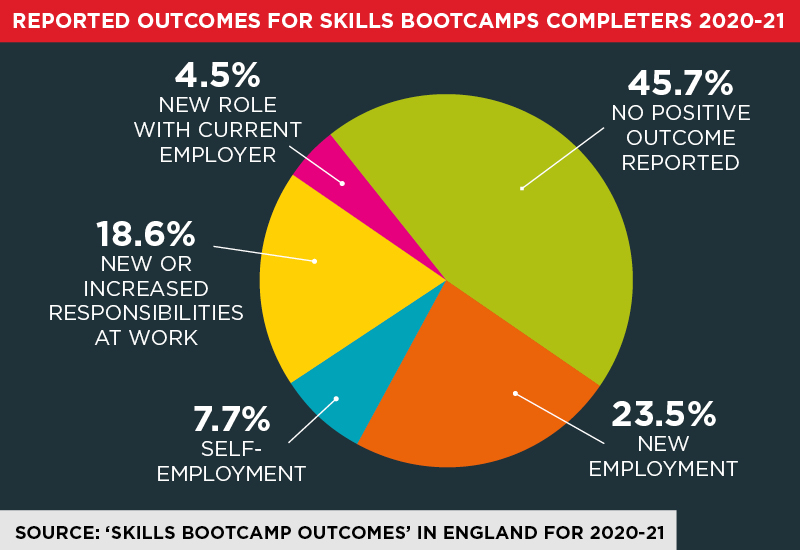The government’s flagship skills bootcamps failed to deliver improved employment outcomes to nearly half if its first cohort of learners, new figures reveal.
Outcome measures for the first wave of bootcamps released by the Department for Education today also show that at least one in five participants dropped out during the 16 week programme.
Of those that did complete, 54 per cent achieved a new or better job.
Outcomes have been reported by providers and cover the period September 2020 to March 2021.
As with a previous evaluation of the bootcamp programme, these new figures are also problematic. The Department admits that some providers “only submitted data for participants that completed a bootcamp”.
It’s therefore likely that the total number of participants on skills bootcamps is higher than the 2,800 reported, while the reported number of those that completed, 2,210 appears to be more reliable.
Skills bootcamps were announced in September 2020 and are a key pillar of the government’s national skills fund. They are also set to benefit from the Chancellor’s spending review boost to skills spending.
Today’s figures cover wave one of the bootcamps which were delivered by 48 providers, made of independent training providers, further education colleges, local enterprise partnerships, combined authorities and universities.
Of the 2,210 participants that completed their bootcamp, 520 progressed to a new job, 410 gained increased responsibility in their current job, 170 gained new self-employment opportunities and 100 gained a new role with their existing employer.

Today’s figures did not break down bootcamp participation and outcomes by sector or provider. The programmes run for up to 16 weeks in priority sectors; construction, digital, green skills, rail and engineering and manufacturing.
Simon Ashworth, director of policy at the Association of Employment and Learning Providers, said bootcamps “have fantastic potential” and attributed low employment outcomes to the way the data has been recorded.
“It’s important to recognise that this is still a new programme”, Ashworth told FE Week adding that “at this early stage there are positives, with just under 80 per cent of participants completing the programme”.
“Although job outcomes are lower than expected, it is likely that some positive outcomes have been missed due to the way data has been recorded. More accurate performance measures must be put in place before we cast judgement on the scheme’s overall merit.”
The DfE told FE Week they are working with providers on improving data returns, including linking payments to bootcamp providers more closely with outcomes.
Skills bootcamps are not subject to Ofsted inspections, however it was announced in September that inspectors will conduct a “thematic survey” on the quality of education and curriculum of skills bootcamps.
The DfE said at the time that they could fall within scope for full inspections “if and when” they become a regular programme with regular funding.
The DfE has been approached for comment.









It would be totally unrealistic to think that the Boot camps were going to achieve massive employment gains given the limited nature of the delivery in time and skill development. I would also question the outcomes for those already in work, surely that is not a target group of these types of interventions. There is one area of exception to that though moving young people from the low skill level roles that often are encouraged through Level 2 apprenticeships around customer service etc which trap young people in a vacuum of aspiration, if the Boot camps move that group into meaningful skilled roles then I would consider that to be an excellent outcome.